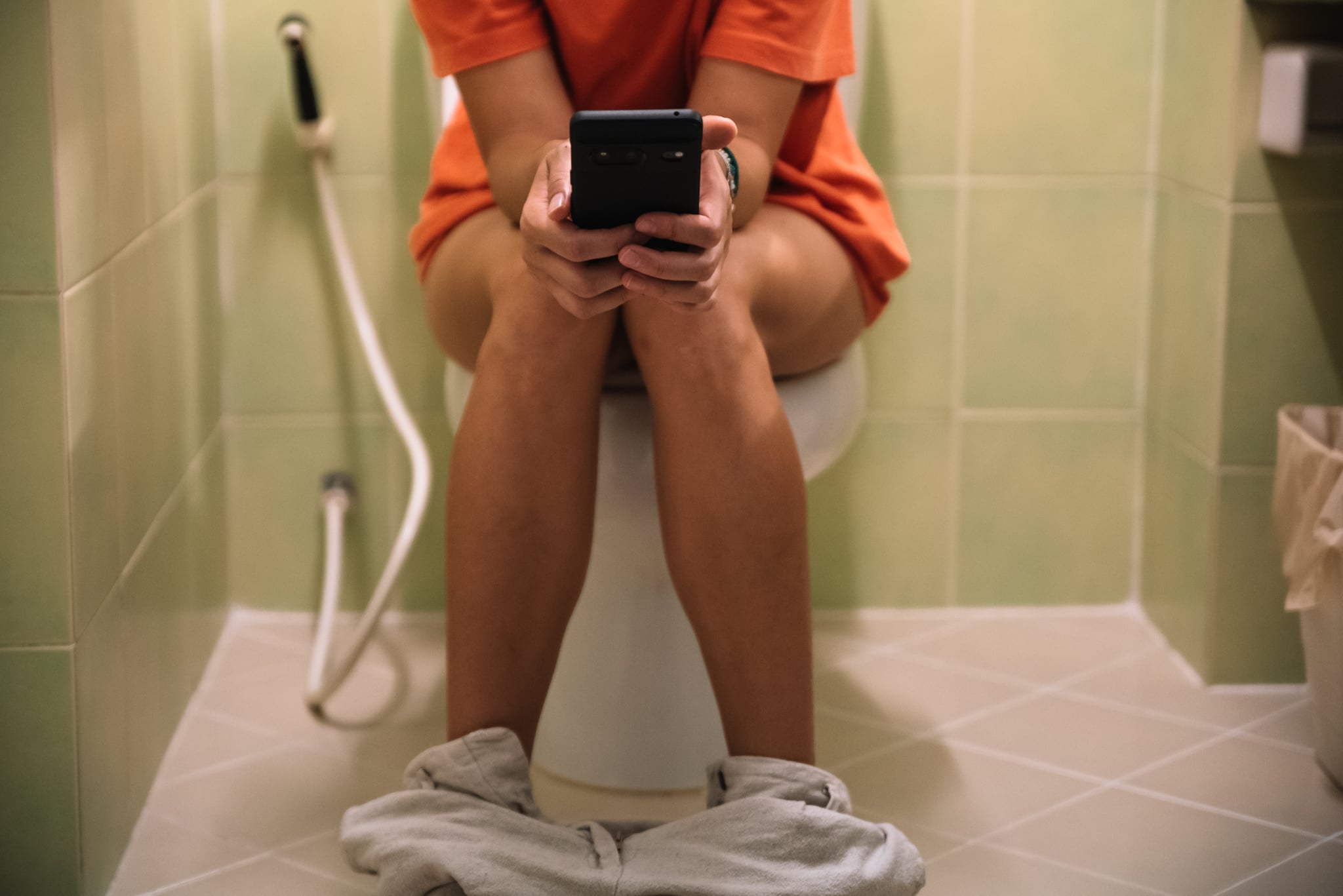
When it’s that time of the month, your period makes itself known. Between cramps, cravings, mood swings, and hormonal acne, there’s a whole slew of symptoms to accompany your menstrual cycle. But you may also experience abnormal bathroom habits, commonly known as “period poops.”
Period poops are the change in your bowel habits during your menstrual cycle, says Jill Hechtman, MD, a board-certified ob-gyn and medical director at Broward Health Coral Springs. These poops tend to happen more frequently than those outside your menstrual cycle and are often accompanied by other symptoms of digestive distress (think: diarrhea or constipation). Sound familiar? No need to be embarrassed. You’re not the only one who gets period poops. Research has shown that 73 percent of women experience a change in their bowel habits during their menstrual cycle. So don’t feel bad if you’re taking way more trips to the bathroom. Pooping a lot during your period is pretty common.
But what causes period poops in the first place? Is it normal to have a stabbing pain when pooping during your period? And how long do period poops last? Ahead, doctors weigh in on everything you need to know about pesky period poops.
Are Period Poops Normal?
Yes. Period poops are normal, and diarrhea is common during your menstrual cycle, Dr. Hechtman says. “It occurs because a fatty acid called prostaglandin, and prostaglandins relax smooth muscle,” she explains. These hormone-like compounds help shed the uterine lining, which results in your period, but they also work similarly on the bowel, Dr. Hechtman adds.
As a result, the prostaglandins can induce uterine and bowel contractions, which brings a change in your bowel movements, says Aparna Sridhar, MD, a board-certified ob-gyn and associate professor of clinical obstetrics and gynecology at the David Geffen School of Medicine at UCLA. This then presents as diarrhea, loose stool, or frequent bathroom trips, she explains.
Period poops typically last during the course of your menstrual cycle, but can start a day or two beforehand due to the change in hormone levels, per Dr. Hechtman.
Why Do I Get Diarrhea During My Period?
Each month when your period begins, prostaglandins are released and begin to relax the tissues inside your uterus to help shed its lining, Dr. Sridhar says. Those same prostaglandins can also impact your bowels and lead to diarrhea and/or loose stools, she explains.
Plus, research shows that prostaglandins also affect smooth muscle in the gastrointestinal tract and cause induced secretion of electrolytes in the small bowel. As a result, this can lead to stomach discomfort such as cramping, bloating, and diarrhea.
Why Is Pooping on Your Period So Different?
In addition to the prostaglandins’ effect on your bowels, which triggers diarrhea and loose stool, progesterone could also play a role in your atypical poops. Progesterone is responsible for the growth and thickening of the uterine walls, and it peaks right before you ovulate (aka when your ovary releases an egg). The extra progesterone can cause food to move slowly through your intestines, which then induces constipation, Dr. Hechtman says.
So, an increase of both progesterone and prostaglandins causes you to poop differently when on your period, Dr. Hechtman explains. In other words, blame the hormones!
Is It Normal to Experience Pain When Pooping During Your Period?
Discomfort when pooping is common during your period, so it can be normal to feel some pain here and there, Dr. Hechtman says. “Pain can occur secondary to the cramps from the uterus, but also from symptoms like constipation and diarrhea,” she explains. “A menstrual cramp itself leads to a feeling of pressure in the pelvis, low back, and buttocks, and constipation happens because of changes in your hormones and an increase in progesterone,” she adds. Because of this, you may experience abdominal pain; straining when trying to pass hard, bulky stool; and bloating.
That said, if you have severe pain and/or persistent diarrhea or constipation, it’s time to check in with your doctor, Dr. Sridhar says. “Pain can be a normal response to prostaglandin production in some women, but if the pain is severe enough to alter your daily life or quality of life, it is abnormal and needs medical attention.”
How to Deal With Period Poops
Again, period poops are 100 percent normal and these hormonal changes can’t be helped. But if you’re looking to keep some of the digestive issues at bay, Cleveland Clinic has a few suggestions:
- Be mindful of your diet: Certain beverages may have a laxative effect, like coffee and alcohol. So limiting your intake when experiencing period poops or diarrhea can be beneficial. It may also be helpful to avoid greasy, fried, or junk food, which can lead to smelly stool and gas. Instead opt for fruits, vegetables, and leafy greens, as well as natural fiber.
- Drink more water: Experts can’t emphasize this one enough. When you poop more frequently, especially when experiencing diarrhea, you lose more fluids. Staying hydrated can help you avoid dehydration.
- Take medication: Cleveland Clinic recommends ibuprofen before the start of your period, which may prevent the release of prostaglandins and therefore can help with period and period-poop pain relief. Stool softeners such as MiraLax are recommended to relieve constipation.
That said, if your period is causing severe pain or persistent diarrhea or constipation, it’s best to see a doctor. Your quality of life should not be comprised by your bowel movements.
